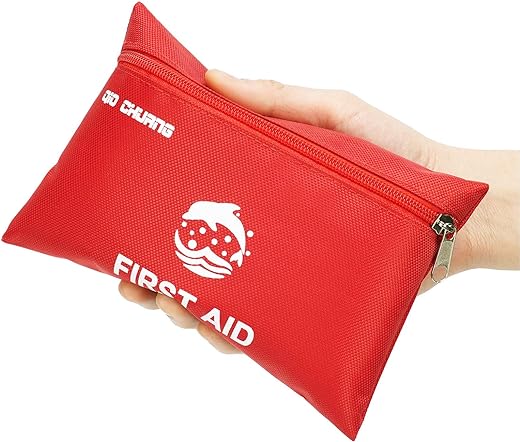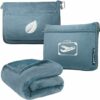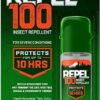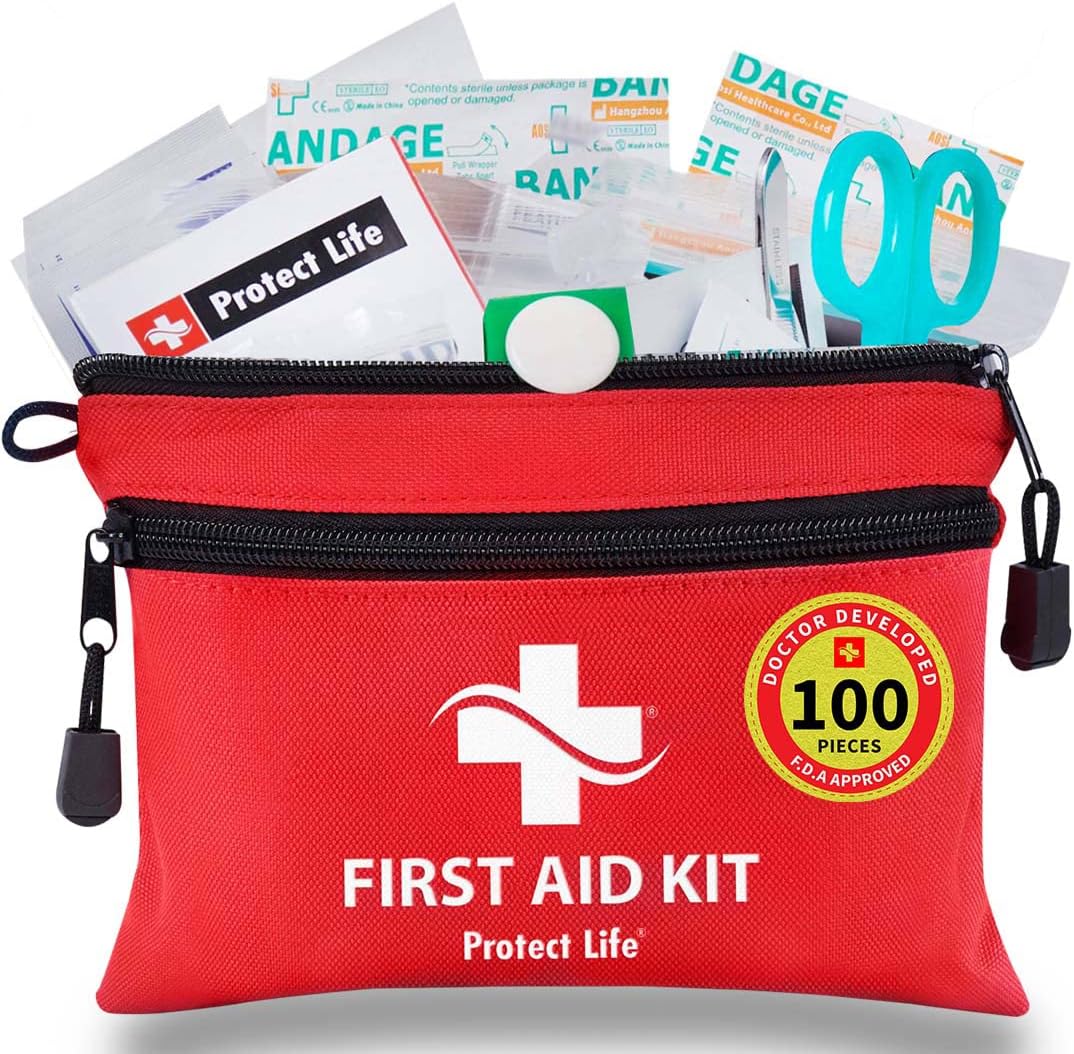
The step-by-step guide “How to Stay Healthy and Care for Minor Injuries While Traveling” provides valuable information on how to take care of your health and handle minor injuries when you’re on the go. One essential item that the guide emphasizes is a travel-sized first aid kit. This comprehensive guide aims to equip travelers with the necessary knowledge and tools to maintain their well-being during their trips. Whether it’s dealing with common ailments or minor injuries, this guide covers it all, ensuring that you can enjoy your travels while staying safe and healthy.
Stay Prepared on the Go!
Preparing a Travel-sized First Aid Kit
To prepare a travel-sized first aid kit, gather essential supplies that will come in handy during emergencies. Here’s a breakdown of what you’ll need:
- Adhesive bandages: These are a must-have for covering small cuts and scrapes. Include a variety of sizes to accommodate different wounds.
- Antiseptic wipes: These wipes are useful for cleaning wounds and preventing infection. Pack a few individually wrapped wipes for convenience.
- Gauze pads: Get a few sterile gauze pads to dress larger wounds or to apply pressure on bleeding areas.
- Tweezers: These are handy for removing splinters, thorns, or any foreign objects that may get lodged in the skin.
- Pain relievers: Include a small packet of over-the-counter pain relievers like ibuprofen or acetaminophen, which can help alleviate minor aches and pains.
Once you have gathered these supplies, pack them into a small, portable container or pouch. This will keep everything organized and easily accessible when needed. Remember, it’s always better to be prepared, so make sure to replenish your first aid kit as needed and check expiration dates regularly.
Research and Understand Common Travel Health Risks
To ensure a healthy and worry-free trip, it is important to learn about the potential health risks at your destination. Start by researching the common health risks associated with the country or region you plan to visit. For example, if you are traveling to a tropical area, you may need to be aware of diseases such as malaria or dengue fever.
Once you have identified the potential risks, check if any vaccinations or medications are required for your destination. You can visit websites such as the Centers for Disease Control and Prevention (CDC) or the World Health Organization (WHO) for up-to-date information on recommended vaccinations. For instance, if you are traveling to parts of Africa, you may need to get vaccinated against yellow fever.
If you are unsure about which vaccinations or medications are necessary for your trip, it is advisable to consult with a travel health professional. They can provide personalized advice based on your specific travel plans and medical history. Remember, it’s better to be safe than sorry, so take the time to research and consult with a professional to ensure you are well-prepared for any potential health risks at your destination.
Maintaining Good Hygiene Practices
To maintain good hygiene practices, it is important to wash your hands regularly with soap and water or use hand sanitizer. This simple act helps to eliminate germs and prevent the spread of diseases. Remember to lather your hands with soap for at least 20 seconds, ensuring that you cover all surfaces including the back of your hands, between your fingers, and under your nails. Rinse thoroughly with water and dry your hands with a clean towel or air dryer.
In addition, it is crucial to avoid touching your face as much as possible. Our hands come into contact with numerous surfaces throughout the day, making them a potential carrier of germs. Touching your face, particularly your eyes, nose, and mouth, increases the risk of transferring these germs into your body. By practicing self-awareness and refraining from touching your face, you can help reduce the likelihood of infection.
When it comes to handling food, maintaining proper hygiene is essential. Before preparing or eating food, make sure to wash your hands thoroughly using the same technique mentioned earlier. This step helps to eliminate any bacteria or viruses that may be present on your hands. Additionally, ensure that the surfaces and utensils used for food preparation are clean and sanitized. Regularly clean and disinfect kitchen counters, cutting boards, knives, and other utensils to prevent cross-contamination.
Remember, good hygiene practices are crucial in safeguarding your health and the health of those around you. By following these simple steps of washing your hands regularly, avoiding touching your face, and maintaining proper hygiene when handling food, you can help minimize the risk of illnesses and promote a healthier environment.
Staying Active and Eating Well
Engaging in physical activity while traveling can be a great way to stay active and maintain your overall well-being. One simple and accessible activity is walking. Make it a point to explore your surroundings on foot whenever possible. Take a stroll through local parks, neighborhoods, or even along the beach if you’re near one. Not only does walking allow you to experience your destination in a unique and intimate way, but it also helps to improve your cardiovascular health and burn calories.
In addition to walking, incorporating stretching into your routine can help keep your muscles flexible and relaxed, especially after long hours of sitting during travel. Stretching can be done anywhere, whether you’re waiting for your flight or taking a break at a rest area. Focus on stretching your major muscle groups such as your legs, arms, and back. Don’t forget to breathe deeply and hold each stretch for about 15-30 seconds.
When it comes to eating well while traveling, the key is to prioritize nutritious meals. Look for options that include a good balance of protein, carbohydrates, and healthy fats. Opt for fresh fruits and vegetables whenever possible, as they provide essential vitamins and minerals. Choose lean sources of protein like grilled chicken or fish, and whole grains such as brown rice or whole wheat bread. It’s also important to stay hydrated, so drink plenty of water throughout your journey. Carry a refillable water bottle with you and make it a habit to sip water regularly, especially in warm climates or during strenuous activities.
By incorporating these simple tips into your travel routine, you can stay active, nourished, and energized throughout your journey. Enjoy the experience while taking care of your well-being!
Protecting Yourself from Sunburn
- Apply sunscreen with a high SPF: Prior to stepping out into the sun, generously apply sunscreen with a high Sun Protection Factor (SPF) to all exposed areas of your skin. Start by squeezing a sufficient amount of sunscreen onto your palm, and then apply it evenly, making sure to cover areas such as your face, neck, arms, and legs. Remember to also apply sunscreen to often neglected areas like your ears, the back of your neck, and the tops of your feet. Don’t forget to reapply every two hours, especially if you’ve been swimming or sweating.
- Wear protective clothing: Along with sunscreen, wearing protective clothing is crucial in shielding your skin from harmful UV rays. Opt for lightweight, loose-fitting clothing that covers a maximum surface area, such as long-sleeved shirts, wide-brimmed hats, and long pants or skirts. Additionally, consider investing in clothing with built-in UV protection, as it offers an extra layer of defense against the sun.
- Seek shade during the hottest hours of the day: When the sun is at its peak, usually between 10 am and 4 pm, it’s important to seek shade to minimize your exposure to intense UV rays. Find a shady spot under a tree, an umbrella, or any other form of shelter that provides adequate shade. Taking breaks in shaded areas allows your body to cool down and reduces the risk of heat-related illnesses.
By diligently following these instructions, you’ll greatly reduce the chances of sunburn and heat-related illnesses. Stay safe and enjoy the outdoors responsibly!
Handling Minor Injuries
To handle minor injuries effectively, it’s important to follow a few simple steps. First, clean any wounds thoroughly with antiseptic solution or mild soap and water. Gently remove any dirt or debris from the affected area. This helps reduce the risk of infection.
Next, apply an appropriate bandage or dressing to protect the wound and promote healing. Use sterile materials whenever possible, and make sure the bandage is not too tight or restrictive. If the injury requires stitches or more advanced medical treatment, it’s crucial to seek professional medical attention.
Lastly, keep an eye out for signs of infection, such as increasing pain, redness, swelling, or pus. If any of these symptoms persist or worsen, it’s essential to consult a healthcare professional for further evaluation and treatment.
Remember, by following these simple steps and monitoring your injury closely, you can effectively handle minor injuries and promote a speedy recovery.
Wrap Up and Stay Safe
In conclusion, staying healthy and caring for minor injuries while traveling is essential for a smooth and enjoyable trip. By being prepared with a travel first aid kit, practicing good hygiene, staying active and eating well, protecting yourself from the sun, and knowing how to handle minor injuries, you can ensure a safe and worry-free journey. Remember, taking care of your health is the key to making the most out of your travel experiences. Safe travels!













I would love to see a section on mental health and self-care while traveling. It’s important to take care of our mental well-being as well, especially during long trips or when facing unexpected challenges. Tips on managing stress, practicing mindfulness, or finding support resources would be valuable additions to the guide.
Thank you for your suggestion! Mental health and self-care are indeed crucial aspects of staying healthy while traveling. Including a section on managing stress, practicing mindfulness, and finding support resources would be beneficial. I appreciate your input and will consider incorporating these topics into future revisions of the guide.
I would suggest adding a section on staying hydrated while traveling. Dehydration can be a common issue, especially during long flights or when visiting hot climates. It would be helpful to provide tips on how to stay hydrated, such as carrying a reusable water bottle and drinking enough fluids throughout the day.
Thank you for sharing your variation! Creating a personalized first aid kit can definitely be a great option for those who want to tailor it to their specific needs. It’s also a good way to save money by only purchasing the essential items. However, it’s important to ensure that all necessary items are included to handle common travel health risks.
I found a different way to prepare a travel-sized first aid kit. Instead of buying a pre-made kit, I prefer to create my own by selecting specific items that I know I will need. This allows me to customize the kit based on my personal health needs and the type of trip I am taking. It also helps me save money by not buying unnecessary items.
I have a tip for maintaining good hygiene practices while traveling. I always carry a small bottle of hand sanitizer with me. It’s convenient to use when soap and water are not readily available. I find it especially useful during long bus or train rides when I can’t wash my hands frequently. It’s a simple but effective way to prevent the spread of germs.
That’s a great tip! Hand sanitizer is indeed a convenient option for maintaining good hygiene when traditional handwashing facilities are not accessible. It’s a practical solution during travel, especially in situations where frequent handwashing is not possible. Thanks for sharing your experience!
I followed the guide during my recent trip to Southeast Asia, and I had a great experience. The tips on researching and understanding common travel health risks helped me prepare for potential illnesses and take necessary precautions. I also found the section on staying active and eating well very useful. By incorporating physical activity and healthy eating habits into my trip, I felt energized and maintained my overall well-being. Thank you for this informative guide!
That’s wonderful to hear! I’m glad that the guide was helpful and that you had a positive experience implementing the tips. Your success story is inspiring and it reinforces the importance of taking care of our health while traveling. Thank you for sharing your feedback!